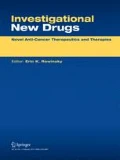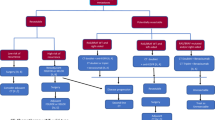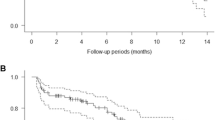Summary
Amatuximab is a promising therapeutic antibody targeting mesothelin, a 40-kDa glycoprotein that is highly expressed in pancreatic cancer. We investigated the effectiveness of early amatuximab treatment, imitating an adjuvant chemotherapy setting, and combination therapy with amatuximab and gemcitabine in liver metastasis of pancreatic cancer. Liver metastasis mouse models were established in 8-week-old male BALB/c nu/nu mice using the hemisplenic injection method. Tridaily amatuximab monotherapy or combination with gemcitabine was administered to the liver metastasis mouse model before metastatic lesions had formed huge masses. Gaussia luciferase-transfected AsPC-1 was used as a mesothelin-overexpressing pancreatic cancer cell line. The amount of liver metastases and the serum luciferase activity were significantly lower in the treatment groups than those in the control IgG group. Notably, the anti-tumor activity of gemcitabine was synergically enhanced by combination therapy with amatuximab. Furthermore, western blotting revealed that the high expression of phosphorylated c-Met and AKT in liver metastatic lesions treated with gemcitabine monotherapy was canceled by its combination with amatuximab. This result indicated that the observed synergic therapeutic effect may have occurred as a result of the inhibitory effect of amatuximab on the phosphorylation of c-Met and AKT, which were promoted by exposure to GEM. In conclusion, our study revealed that early administration of amatuximab alone or in combination with GEM significantly suppressed the liver metastases of mesothelin-expressing pancreatic cancer cells. A phase II clinical trial of amatuximab as part of an adjuvant chemotherapy regimen for resected pancreatic cancer is expected.





Similar content being viewed by others
Data availability
The authors confirm that the data supporting the findings of this study are available within the article and its supplementary materials.
Abbreviations
- ADCC:
-
antibody-dependent cellular cytotoxicity
- FACS:
-
fluorescence-activated cell sorting
- GEM:
-
gemcitabine
- Gluc:
-
Gaussia luciferase
- H&E:
-
hematoxylin and eosin
- IHC:
-
immunohistochemistry
- MSLN:
-
mesothelin
- OS:
-
overall survival
- PBS:
-
phosphate-buffered saline
- PDAC:
-
pancreatic ductal adenocarcinoma
- RLU:
-
relative light unit
References
Siegel RL, Miller KD, Jemal A (2019) Cancer statistics, 2019. CA Cancer J Clin 69:7–34. https://doi.org/10.3322/caac.21551
He J, Ahuja N, Makary MA, Cameron JL, Eckhauser FE, Choti MA, Hruban RH, Pawlik TM, Wolfgang CL (2014) 2564 resected periampullary adenocarcinomas at a single institution: trends over three decades. HPB (Oxford) 16:83–90. https://doi.org/10.1111/hpb.12078
Katz MH, Wang H, Fleming JB et al (2009) Long-term survival after multidisciplinary management of resected pancreatic adenocarcinoma. Ann Surg Oncol 16:836–847. https://doi.org/10.1245/s10434-008-0295-2
Ferrone CR, Brennan MF, Gonen M, Coit DG, Fong Y, Chung S, Tang L, Klimstra D, Allen PJ (2008) Pancreatic adenocarcinoma: the actual 5-year survivors. J Gastrointest Surg 12:701–706. https://doi.org/10.1007/s11605-007-0384-8
Ferrone CR, Pieretti-Vanmarcke R, Bloom JP, Zheng H, Szymonifka J, Wargo JA, Thayer SP, Lauwers GY, Deshpande V, Mino-Kenudson M, Fernández-del Castillo C, Lillemoe KD, Warshaw AL (2012) Pancreatic ductal adenocarcinoma: long-term survival does not equal cure. Surgery 152:S43–S49. https://doi.org/10.1016/j.surg.2012.05.020
Labori KJ, Katz MH, Tzeng CW, Bjørnbeth BA, Cvancarova M, Edwin B, Kure EH, Eide TJ, Dueland S, Buanes T, Gladhaug IP (2016) Impact of early disease progression and surgical complications on adjuvant chemotherapy completion rates and survival in patients undergoing the surgery first approach for resectable pancreatic ductal adenocarcinoma - a population-based cohort study. Acta Oncol 55:265–277. https://doi.org/10.3109/0284186X.2015.1068445
Oettle H, Neuhaus P, Hochhaus A, Hartmann JT, Gellert K, Ridwelski K, Niedergethmann M, Zülke C, Fahlke J, Arning MB, Sinn M, Hinke A, Riess H (2013) Adjuvant chemotherapy with gemcitabine and long-term outcomes among patients with resected pancreatic cancer: the CONKO-001 randomized trial. JAMA 310:1473–1481. https://doi.org/10.1001/jama.2013.279201
Parikh AA, Maiga A, Bentrem D, Squires MH III, Kooby DA, Maithel SK, Weber SM, Cho CS, Katz M, Martin RC, Scoggins CR, Sutton J, Ahmad SA, Abbott DE, Carr J, Kim HJ, Yakoub D, Idrees K, Merchant N (2016) Adjuvant therapy in pancreas Cancer: does it influence patterns of recurrence? J Am Coll Surg 222:448–456. https://doi.org/10.1016/j.jamcollsurg.2015.12.031
Ueno H, Kosuge T, Matsuyama Y, Yamamoto J, Nakao A, Egawa S, Doi R, Monden M, Hatori T, Tanaka M, Shimada M, Kanemitsu K (2009) A randomised phase III trial comparing gemcitabine with surgery-only in patients with resected pancreatic cancer: Japanese study Group of Adjuvant Therapy for pancreatic Cancer. Br J Cancer 101:908–915. https://doi.org/10.1038/sj.bjc.6605256
Uesaka K, Boku N, Fukutomi A, Okamura Y, Konishi M, Matsumoto I, Kaneoka Y, Shimizu Y, Nakamori S, Sakamoto H, Morinaga S, Kainuma O, Imai K, Sata N, Hishinuma S, Ojima H, Yamaguchi R, Hirano S, Sudo T, Ohashi Y (2016) Adjuvant chemotherapy of S-1 versus gemcitabine for resected pancreatic cancer: a phase 3, open-label, randomised, non-inferiority trial (JASPAC 01). Lancet 388:248–257. https://doi.org/10.1016/s0140-6736(16)30583-9
Groot VP, Blair AB, Gemenetzis G, Ding D, Burkhart RA, Yu J, Borel Rinkes IHM, Molenaar IQ, Cameron JL, Weiss MJ, Wolfgang CL, He J (2019) Recurrence after neoadjuvant therapy and resection of borderline resectable and locally advanced pancreatic cancer. Eur J Surg Oncol 45:1674–1683. https://doi.org/10.1016/j.ejso.2019.04.007
Groot VP, Rezaee N, Wu W, Cameron JL, Fishman EK, Hruban RH, Weiss MJ, Zheng L, Wolfgang CL, He J (2018) Patterns, timing, and predictors of recurrence following Pancreatectomy for pancreatic ductal adenocarcinoma. Ann Surg 267:936–945. https://doi.org/10.1097/SLA.0000000000002234
Hattangadi JA, Hong TS, Yeap BY, Mamon HJ (2009) Results and patterns of failure in patients treated with adjuvant combined chemoradiation therapy for resected pancreatic adenocarcinoma. Cancer 115:3640–3650. https://doi.org/10.1002/cncr.24410
Chang K, Pastan I (1996) Molecular cloning of mesothelin, a differentiation antigen present on mesothelium, mesotheliomas, and ovarian cancers. Proc Natl Acad Sci U S A 93:136–140. https://doi.org/10.1073/pnas.93.1.136
Hassan R, Thomas A, Alewine C, Le DT, Jaffee EM, Pastan I (2016) Mesothelin immunotherapy for Cancer: ready for prime time? J Clin Oncol 34:4171–4179. https://doi.org/10.1200/JCO.2016.68.3672
Tang Z, Qian M, Ho M (2013) The role of mesothelin in tumor progression and targeted therapy. Anti Cancer Agents Med Chem 13:276–280. https://doi.org/10.2174/1871520611313020014
Yen MJ, Hsu CY, Mao TL, Wu TC, Roden R, Wang TL, Shih IM (2006) Diffuse mesothelin expression correlates with prolonged patient survival in ovarian serous carcinoma. Clin Cancer Res 12:827–831. https://doi.org/10.1158/1078-0432.CCR-05-1397
Einama T, Kamachi H, Nishihara H, Homma S, Kanno H, Takahashi K, Sasaki A, Tahara M, Okada K, Muraoka S, Kamiyama T, Matsuno Y, Ozaki M, Todo S (2011) Co-expression of mesothelin and CA125 correlates with unfavorable patient outcome in pancreatic ductal adenocarcinoma. Pancreas 40:1276–1282. https://doi.org/10.1097/MPA.0b013e318221bed8
Hassan R, Laszik ZG, Lerner M, Raffeld M, Postier R, Brackett D (2005) Mesothelin is overexpressed in Pancreaticobiliary adenocarcinomas but not in Normal pancreas and chronic pancreatitis. Am J Clin Pathol 124:838–845. https://doi.org/10.1309/f1b64cl7h8vjkeaf
Gubbels JA, Belisle J, Onda M et al (2006) Mesothelin-MUC16 binding is a high affinity, N-glycan dependent interaction that facilitates peritoneal metastasis of ovarian tumors. Mol Cancer 5:50. https://doi.org/10.1186/1476-4598-5-50
Rump A, Morikawa Y, Tanaka M, Minami S, Umesaki N, Takeuchi M, Miyajima A (2004) Binding of ovarian cancer antigen CA125/MUC16 to mesothelin mediates cell adhesion. J Biol Chem 279:9190–9198. https://doi.org/10.1074/jbc.M312372200
Bharadwaj U, Li M, Chen C, Yao Q (2008) Mesothelin-induced pancreatic cancer cell proliferation involves alteration of cyclin E via activation of signal transducer and activator of transcription protein 3. Mol Cancer Res 6:1755–1765. https://doi.org/10.1158/1541-7786.MCR-08-0095
Chang MC, Chen CA, Hsieh CY, Lee CN, Su YN, Hu YH, Cheng WF (2009) Mesothelin inhibits paclitaxel-induced apoptosis through the PI3K pathway. Biochem J 424:449–458. https://doi.org/10.1042/BJ20082196
Cheng WF, Hung CF, Chai CY, Chen CA, Lee CN, Su YN, Tseng WYI, Hsieh CY, Shih IM, Wang TL, Wu TC (2007) Generation and characterization of an ascitogenic mesothelin-expressing tumor model. Cancer 110:420–431. https://doi.org/10.1002/cncr.22781
He X, Wang L, Riedel H, Wang K, Yang Y, Dinu CZ, Rojanasakul Y (2017) Mesothelin promotes epithelial-to-mesenchymal transition and tumorigenicity of human lung cancer and mesothelioma cells. Mol Cancer 16:63. https://doi.org/10.1186/s12943-017-0633-8
Li M, Bharadwaj U, Zhang R, Zhang S, Mu H, Fisher WE, Brunicardi FC, Chen C, Yao Q (2008) Mesothelin is a malignant factor and therapeutic vaccine target for pancreatic cancer. Mol Cancer Ther 7:286–296. https://doi.org/10.1158/1535-7163.MCT-07-0483
Uehara N, Matsuoka Y, Tsubura A (2008) Mesothelin promotes anchorage-independent growth and prevents anoikis via extracellular signal-regulated kinase signaling pathway in human breast cancer cells. Mol Cancer Res 6:186–193. https://doi.org/10.1158/1541-7786.MCR-07-0254
Cheng WF, Huang CY, Chang MC, Hu YH, Chiang YC, Chen YL, Hsieh CY, Chen CA (2009) High mesothelin correlates with chemoresistance and poor survival in epithelial ovarian carcinoma. Br J Cancer 100:1144–1153. https://doi.org/10.1038/sj.bjc.6604964
Einama T, Homma S, Kamachi H, Kawamata F, Takahashi K, Takahashi N, Taniguchi M, Kamiyama T, Furukawa H, Matsuno Y, Tanaka S, Nishihara H, Taketomi A, Todo S (2012) Luminal membrane expression of mesothelin is a prominent poor prognostic factor for gastric cancer. Br J Cancer 107:137–142. https://doi.org/10.1038/bjc.2012.235
Einama T, Kamachi H, Nishihara H et al (2015) Importance of luminal membrane mesothelin expression in intraductal papillary mucinous neoplasms. Oncol Lett 9:1583–1589. https://doi.org/10.3892/ol.2015.2969
Kawamata F, Homma S, Kamachi H, Einama T, Kato Y, Tsuda M, Tanaka S, Maeda M, Kajino K, Hino O, Takahashi N, Kamiyama T, Nishihara H, Taketomi A, Todo S (2014) C-ERC/mesothelin provokes lymphatic invasion of colorectal adenocarcinoma. J Gastroenterol 49:81–92. https://doi.org/10.1007/s00535-013-0773-6
Kawamata F, Kamachi H, Einama T et al (2012) Intracellular localization of mesothelin predicts patient prognosis of extrahepatic bile duct cancer. Int J Oncol 41:2109–2118. https://doi.org/10.3892/ijo.2012.1662
Suzuki T, Yamagishi Y, Einama T, Koiwai T, Yamasaki T, Fukumura‑koga M, Ishibashi Y, Takihata Y, Shiraishi T, Miyata Y, Iwasaki T, Shinto E, Sato K, Ueno H, Yamamoto J, Kishi Y, Tsuda H (2020) Membrane mesothelin expression positivity is associated with poor clinical outcome of luminal-type breast cancer. Oncol Lett 20:193. https://doi.org/10.3892/ol.2020.12055
Hassan R, Ebel W, Routhier EL et al (2007) Preclinical evaluation of MORAb-009, a chimeric antibody targeting tumor-associated mesothelin. Cancer Immun 7:20
Feng Y, Xiao X, Zhu Z, Streaker E, Ho M, Pastan I, Dimitrov DS (2009) A novel human monoclonal antibody that binds with high affinity to mesothelin-expressing cells and kills them by antibody-dependent cell-mediated cytotoxicity. Mol Cancer Ther 8:1113–1118. https://doi.org/10.1158/1535-7163.MCT-08-0945
Fujimori K, Covell DG, Fletcher JE, Weinstein JN (1990) A modeling analysis of monoclonal antibody percolation through tumors: a binding-site barrier. J Nucl Med 31:1191–1198
Lindenberg L, Thomas A, Adler S et al (2015) Safety and biodistribution of 111In-amatuximab in patients with mesothelin expressing cancers using single photon emission computed tomography-computed tomography (SPECT-CT) imaging. Oncotarget 6:4496–4504. https://doi.org/10.18632/oncotarget.2883
Uzunparmak B, Sahin IH (2019) Pancreatic cancer microenvironment: a current dilemma. Clin Transl Med 8:2. https://doi.org/10.1186/s40169-019-0221-1
Shin IS, Lee SM, Kim HS, Yao Z, Regino C, Sato N, Cheng KT, Hassan R, Campo MF, Albone EF, Choyke PL, Pastan I, Paik CH (2011) Effect of chelator conjugation level and injection dose on tumor and organ uptake of 111In-labeled MORAb-009, an anti-mesothelin antibody. Nucl Med Biol 38:1119–1127. https://doi.org/10.1016/j.nucmedbio.2011.05.003
Lee JH, Kim H, Yao Z, Lee SJ, Szajek LP, Grasso L, Pastan I, Paik CH (2015) Tumor and organ uptake of (64)cu-labeled MORAb-009 (amatuximab), an anti-mesothelin antibody, by PET imaging and biodistribution studies. Nucl Med Biol 42:880–886. https://doi.org/10.1016/j.nucmedbio.2015.07.008
Mizukami T, Kamachi H, Fujii Y et al (2018) The anti-mesothelin monoclonal antibody amatuximab enhances the anti-tumor effect of gemcitabine against mesothelin-high expressing pancreatic cancer cells in a peritoneal metastasis mouse model. Oncotarget 9:33844–33852. https://doi.org/10.18632/oncotarget.26117
Matsuzawa F, Kamachi H, Mizukami T, Einama T, Kawamata F, Fujii Y, Fukai M, Kobayashi N, Hatanaka Y, Taketomi A (2021) Mesothelin blockage by Amatuximab suppresses cell invasiveness, enhances gemcitabine sensitivity and regulates cancer cell stemness in mesothelin-positive pancreatic cancer cells. BMC Cancer 21:200. https://doi.org/10.1186/s12885-020-07722-3
Flavell DJ, Warnes SL, Bryson CJ, Field SA, Noss AL, Packham G, Flavell SU (2006) The anti-CD20 antibody rituximab augments the immunospecific therapeutic effectiveness of an anti-CD19 immunotoxin directed against human B-cell lymphoma. Br J Haematol 134:157–170. https://doi.org/10.1111/j.1365-2141.2006.06155.x
Nishihara T, Sawada T, Yamamoto A, Yamashita Y, Ho JJL, Kim YS, Chung KHYS (2000) Antibody-dependent cytotoxicity mediated by chimeric monoclonal antibody Nd2 and experimental immunotherapy for pancreatic cancer. Jpn J Cancer Res 91:817–824. https://doi.org/10.1111/j.1349-7006.2000.tb01019.x
Dekkers G, Bentlage AEH, Stegmann TC, Howie HL, Lissenberg-Thunnissen S, Zimring J, Rispens T, Vidarsson G (2017) Affinity of human IgG subclasses to mouse fc gamma receptors. MAbs 9:767–773. https://doi.org/10.1080/19420862.2017.1323159
Ng SS, Tsao MS, Nicklee T, Hedley DW (2001) Wortmannin inhibits pkb/akt phosphorylation and promotes gemcitabine antitumor activity in orthotopic human pancreatic cancer xenografts in immunodeficient mice. Clin Cancer Res 7:3269–3275
Ng SSW, Tsao MS, Chow S, Hedley DW (2000) Inhibition of phosphatidylinositide 3-kinase enhances gemcitabine-induced apoptosis in human pancreatic cancer cells. Cancer Res 60:5451–5455
Fujisaka Y, Kurata T, Tanaka K, Kudo T, Okamoto K, Tsurutani J, Kaneda H, Okamoto I, Namiki M, Kitamura C, Nakagawa K (2015) Phase I study of amatuximab, a novel monoclonal antibody to mesothelin, in Japanese patients with advanced solid tumors. Investig New Drugs 33:380–388. https://doi.org/10.1007/s10637-014-0196-0
Acknowledgements
We are grateful to Dr. Keiji Furuuchi (Morphotek Inc.) for providing amatuximab from Morphotek Inc. We would like to thank Dr. Hidemitsu Kitamura (Institute for Genetic Medicine, Research Section of Disease Control, Hokkaido University) and Dr. Yutaka Hatanaka (Research Division of Companion Diagnostics, Hokkaido University Hospital) for their constructive advice. Finally, we would also like to thank H. Nikki March, PhD, Edanz Group (https://en-author-services.edanz.com/ac) for editing a draft of this manuscript.
Funding
This study was supported by Japan Society for the Promotion of Science under Grant-in-Aid for Scientific Research C-20 K09024.
Author information
Authors and Affiliations
Contributions
Yuki Fujii: Writing - Original Draft, Data Curation, Investigation, Formal Analysis, Visualization. Hirofumi Kamachi: Conceptualization, Methodology, Funding acquisition, Writing - Review & Editing. Fumihiko Matsuzawa: Investigation, Writing - Review & Editing. Tatsuzo Mizukami: Investigation, Writing - Review & Editing. Nozomi Kobayashi: Methodology, Investigation, Resources. Moto Fukai: Resources, Writing - Review & Editing. Akinobu Taketomi: Supervision, Project administration, Writing - Review & Editing.
Corresponding author
Ethics declarations
Ethics approval and consent to participate
This article does not contain any studies with human participants. For this type of study, formal consent is not required. All procedures involving animals and their care were approved by the ethics committee of Hokkaido University and were conducted under institutional and Japanese governmental guidelines for animal experiments.
Consent for publication
All authors consent to the publication of this study.
Research involving human participants and/or animals
This article does not contain any studies with human participants. All procedures involving animals and their care were approved by the ethics committee of Hokkaido University and were conducted under institutional and Japanese governmental guidelines for animal experiments.
Informed consent
For this type of study, formal consent is not required.
Competing interests
All authors declare that they have no competing interests.
Disclosure of potential conflicts of interest
All authors declare that they have no conflicts of interest.
Additional information
Publisher’s note
Springer Nature remains neutral with regard to jurisdictional claims in published maps and institutional affiliations.
Supplementary Information
Supplemental Table 1
(PDF 164 kb)
Supplemental Figure 1
AsPC-1 and Capan-2 expressed robust levels of MSLN whereas Panc-1 and MIA PaCa-2 did not. All cell lines showed robust comparable levels of MUC16 expression. (PDF 81 kb)
Supplemental Figure 2
Comparison of the total tumor weight of liver metastases in the four cell lines (n = 5). Mean total weights of liver metastases in mice with AsPC-1, Capan-2, MIA PaCa-2, and Panc-1 were 665.1 ± 249.2 mg, 6.8 ± 2.1 mg, 4.0 ± 3.9 mg, and 9.3 ± 3.4 mg, respectively. (PDF 81 kb)
Supplemental Figure 3
Comparison of the expression of mesothelin and MUC16 between AsPC-1 and As-PC1-Gluc. (A) Western blotting revealed that AsPC-1-Gluc cells expressed equivalent levels of MSLN and MUC16 to wild-type AsPC-1 cells. (B) FACS analysis revealed strong MSLN expression on the cell surface of both AsPC-1 and AsPC-1-Gluc cells using amatuximab (MORAb-009). (C) A strong correlation was recognized between the number of AsPC-1-Gluc cells and Gluc activity in the medium (R2 = 0.981, P < 0.001). (D) A strong correlation between the total tumor weight of liver metastases and serum Gluc activity was also observed (n = 25; R2 = 0.972, P < 0.001). (PDF 91 kb)
Rights and permissions
About this article
Cite this article
Fujii, Y., Kamachi, H., Matsuzawa, F. et al. Early administration of amatuximab, a chimeric high-affinity anti-mesothelin monoclonal antibody, suppresses liver metastasis of mesothelin-expressing pancreatic cancer cells and enhances gemcitabine sensitivity in a xenograft mouse model. Invest New Drugs 39, 1256–1266 (2021). https://doi.org/10.1007/s10637-021-01118-1
Received:
Accepted:
Published:
Issue Date:
DOI: https://doi.org/10.1007/s10637-021-01118-1




